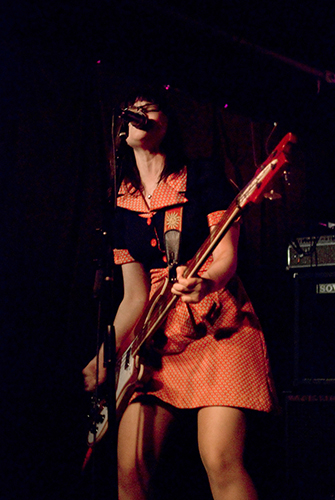

Talk to Grammy Award winner Michele McGonigle, Advertising and Marketing Communications ’99, and you’ll never hear an audiobook the same way again
Not long ago, filmmaker and political activist Michael Moore came to Hachette Audio in midtown Manhattan to record his book Here Comes Trouble. He thought the seat in the studio wasn’t comfortable—at any rate, not as comfortable as his own writing chair. So Michele McGonigle ’99, a director of audio production and executive producer for this division of Hachette Books, arranged to have Moore’s chair brought over from his apartment. “As the director, I have to create a certain atmosphere,” she says.
McGonigle has built her career in audiobooks, whose sales total about eight percent of their print counterparts. Directing an audiobook, she says, is like directing a movie, but with different challenges: “The performer is usually alone in the studio, without other actors or props to play off of.” In her eight years at Hachette, she has coached performances by, among others, Julie Andrews, Tina Fey, and Jon Stewart, whose audio book Earth: A Visitor’s Guide to the Human Race won McGonigle a Grammy (her first) as executive producer. Fey’s Bossypants was recorded in the actor’s apartment late at night so she could work on 30 Rock. Unsurprisingly, Fey was a natural; McGonigle only suggested making the reading less nakedly emotional in spots: “It wasn’t the quality she was going for in that book.”
“What makes a good audiobook is so subjective,” McGonigle says. “Some listeners want the voice to be monotonous; they don’t want it ‘acted,’ they just want to feel the story.” The format has its own difficulties: With rare exceptions, the readings have to match word for word what’s in print. Audiobook listeners are serious, particularly the audience for sci-fi titles; if an author has created an entirely new world, McGonigle must research how all the invented words should be said. Accents have to be consistent: “You can’t have a Scottish character sound Irish—or, say, Jamaican.”
McGonigle also produces (budgeting, setting deadlines, and organizing teams for projects), creates sound design, edits, mixes, and masters the recordings. Hachette develops some 450 audiobooks annually, of which she produces roughly a quarter. She’s been nominated for eight Grammys in her various roles—producer, director, mixing engineer—and won three.
These Books Speak to You
In more than eight years at Hachette Audio, Michele McGonigle has worked with top talent on an array of projects. She has been nominated for eight Grammys and won three.

Fiction audiobooks can be like plays. For Emma Donoghue’s thriller Room, for example, McGonigle cast the actors who voiced the various characters, and fine-tuned their performances to convey the fraught emotions in the story. Working closely with the author, she also created sound effects and chose music from a stock music library. The project came with an additional restriction. When audio rights are acquired, they often come with strict guidelines: a fully developed audio drama can jeopardize the movie option. So the audiobook version had to be scaled down, using four actors instead of a full cast.
For Stephen Colbert’s America Again, McGonigle created sound effects (referred to as “foley” in the industry): Colbert’s character falling out of a chair, jukebox music woven into the narration. She made the sound of someone smoking a bong by blowing bubbles through a straw in a glass. The project won her a Grammy for sound design. Most readings need editing—“people burp, their stomach gurgles,” or they read too slowly. Occasionally, sound effects can be jarring: “We had complaints that gunshots in the background of one audiobook made people duck while driving.” McGonigle works with Pro Tools software
to refine the material.
McGonigle started in Interior Design at FIT, but finished in Advertising and Marketing Communications. She had a disastrous experience with a class assignment to produce a TV spot, but the technology intrigued her in spite of it. So she got an internship at Thirsty Ear Records, which led her to audiobooks—first at Talking Books, then at Audible.com. She met her husband at Hachette; the couple has one son and another on the way.
Once a bass player for several promising rock bands (see below), McGonigle now seems happy working in the more anonymous realm of audiobook production. Asked about where she keeps her Grammys, she laughs. “I try to keep them out of sight; I’m very proud of them, but it feels like bragging.” But every once in a while, she says with a what-can-you-do shrug, “My husband gets them out and puts them on the mantel.”
It’s All About that Bass

In her work as an audiobook producer, McGonigle works behind the scenes, but she also spent 12 years playing bass in a series of punk/indie bands, including The Sense and Magic Robot. She got her start when she was still studying Interior Design at FIT, and called her first band Portico. Her biggest success came with the group The Pervs, which played at numerous spots around New York, including Brownies, where they had a standing gig, and Mercury Lounge. The last group, Plastic Honey, disbanded in 2009. “I never wanted to be a rock star,” she says. “Then it would be a job.” She still makes music, though. When she was adapting the young adult novel Beautiful Creatures, by Kami Garcia and Margaret Stohl, she came across lyrics the authors wrote for the story; she was inspired to create music for and sing the song. The audiobook won a 2011 Audie, and McGonigle’s haunting rendition of “Sixteen Moons” can be found online.